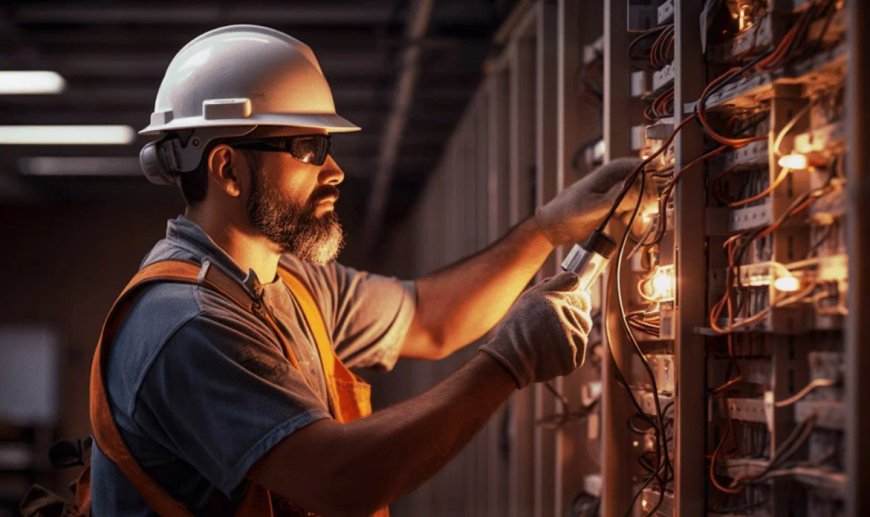Comprehensive Guide to Commercial and Residential Electrical Services

Electricity powers our daily lives, from lighting up our homes to running complex machinery in commercial buildings. Whether youre a homeowner or a business operator, understanding the different types of electrical services available and why professional expertise matters can help you keep your property safe, efficient, and up to code. In this article, well explore commercial electrical services and residential electrical serviceswhat they involve, their key differences, and why hiring licensed electricians is essential.
What Are Commercial Electrical Services?
Commercial electrical services focus on electrical systems designed to support business operations in commercial buildings, including offices, retail stores, warehouses, restaurants, and industrial facilities. These services are usually more complex due to the scale of electrical infrastructure, the higher power demands, and the need to comply with strict safety and regulatory standards.
Common Commercial Electrical Services
- Electrical System Design and Installation: Commercial electricians design and install electrical systems that can handle larger loads and support specialized equipment like HVAC systems, commercial lighting, industrial machinery, and security systems.
- Electrical Panel Upgrades: Many commercial buildings require upgraded electrical panels to safely distribute power and prevent overloads as businesses grow or add new equipment.
- Lighting Solutions: From energy-efficient LED lighting retrofits to emergency exit lights and exterior security lighting, commercial electricians handle a wide range of lighting installations and maintenance.
- Wiring and Rewiring: Ensuring that wiring meets the electrical code and supports new technology is vital for business safety and functionality.
- Maintenance and Repairs: Scheduled maintenance minimizes downtime, while prompt repairs address issues like power outages, faulty circuits, or electrical surges.
- Backup Generators and UPS Systems: Commercial sites often need backup power systems to maintain operations during outages.
- Safety Inspections and Code Compliance: Regular inspections ensure that electrical systems meet local and national electrical codes, reducing fire hazards and liability.
Why Are Commercial Electrical Services Specialized?
Commercial properties often have unique electrical requirements:
- Higher Voltage and Load Capacity: Commercial buildings usually require 240V or higher, compared to typical residential 120V systems.
- Complex Wiring Networks: The wiring must accommodate multiple circuits, machinery, and advanced communication systems.
- Strict Code Compliance: OSHA, NEC (National Electrical Code), and local regulations impose strict standards on commercial electrical installations.
- Safety Risks: Faulty commercial electrical systems can lead to significant safety risks, including fire hazards or operational disruptions.
What Are Residential Electrical Services?
Residential electrical services are designed for homes and apartments. They focus on providing safe, reliable electrical systems to power everyday household needs such as lighting, appliances, HVAC systems, and electronics.
Common Residential Electrical Services
- Electrical Installations: This includes wiring new homes, installing outlets, switches, ceiling fans, lighting fixtures, and home appliances.
- Electrical Repairs: Fixing issues like flickering lights, tripped breakers, faulty outlets, and wiring problems.
- Electrical Upgrades: Older homes often require upgrades such as replacing outdated wiring, installing new electrical panels, or adding additional circuits to support modern appliances.
- Lighting Installation: Installing indoor and outdoor lighting, including recessed lighting, landscape lighting, and security lighting.
- Safety Services: Installing smoke detectors, carbon monoxide detectors, surge protectors, and GFCI outlets in kitchens and bathrooms.
- Home Automation: Integrating smart home technologies such as automated lighting, security systems, and thermostats.
- Electrical Inspections: Ensuring the homes wiring and electrical systems comply with safety standards and local codes.
Why Choose Professional Residential Electrical Services?
Electrical systems in homes may seem simple but require a high level of expertise:
- Safety First: Faulty home wiring is a leading cause of electrical fires.
- Code Compliance: Residential work must adhere to local building codes.
- Preventative Care: Professional inspections can prevent costly repairs or dangerous malfunctions.
- Energy Efficiency: Experts can help homeowners upgrade to energy-efficient solutions that save money long-term.
- Customized Solutions: Professional electricians tailor solutions to fit specific home layouts and family needs.
Key Differences Between Commercial and Residential Electrical Services
Understanding the differences between commercial and residential electrical services helps property owners hire the right professionals for the job.
|
Aspect
|
Commercial Electrical Services
|
Residential Electrical Services
|
|
Scope and Scale
|
Large buildings with complex wiring systems
|
Homes and smaller residential properties
|
|
Voltage Requirements
|
Higher voltage (often 208V, 240V, or more)
|
Standard 120V/240V for most homes
|
|
Code and Safety Regulations
|
Stricter codes and regulations (NEC, OSHA)
|
Local building codes, NEC residential standards
|
|
Types of Equipment
|
Industrial machinery, large HVAC, security systems
|
Home appliances, lighting, small HVAC units
|
|
Maintenance Frequency
|
Regular scheduled maintenance is critical
|
Typically maintenance as needed or during upgrades
|
|
Design Complexity
|
Electrical system design is often customized
|
Mostly standardized wiring and fixture setups
|
Why Hiring Licensed Electricians Matters
Whether for commercial or residential electrical services, hiring licensed and insured electricians is critical. Heres why:
- Safety: Professional electricians are trained to handle electricity safely, minimizing risks of electrical shock, fire, or damage.
- Experience and Knowledge: Licensed electricians understand current electrical codes and standards, ensuring compliant and quality work.
- Proper Tools and Equipment: They come equipped with specialized tools to perform diagnostics, repairs, and installations efficiently.
- Liability Protection: Using licensed professionals protects property owners from liability issues and ensures warranty coverage.
- Troubleshooting Expertise: Professionals can quickly diagnose complex electrical problems that DIY attempts might miss or worsen.
Tips for Choosing the Right Electrical Service Provider
Finding the right electrical service provider is important for the longevity and safety of your electrical system.
- Check Credentials: Verify licenses, insurance, and certifications.
- Experience: Look for providers with experience specific to your commercial or residential needs.
- References and Reviews: Read customer testimonials and ask for references.
- Transparent Pricing: Obtain written estimates and clarify pricing structures.
- Availability: Especially for commercial clients, reliable 24/7 emergency services can be crucial.
- Warranty: Ask about guarantees or warranties on work performed.
Conclusion
Electricity is the backbone of modern life, but working with it requires skill, knowledge, and care. Whether you need commercial electrical services for your business or residential electrical services for your home, professional electricians provide invaluable expertise that keeps your electrical systems safe, efficient, and compliant with regulations. By understanding the scope of these services and the importance of hiring licensed professionals, you can ensure your propertys electrical needs are well-managed and future-proofed.
If youre experiencing electrical problems or planning new installations, contact a trusted licensed electrician today to get expert advice and quality service tailored to your specific needs.



































